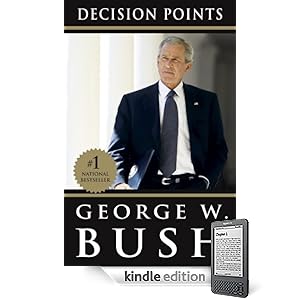 Guest post by David Sawyer, a lawyer in Atlanta, married to Ashley, and in my small group. Find him on Goodreads a online community for readers.
Guest post by David Sawyer, a lawyer in Atlanta, married to Ashley, and in my small group. Find him on Goodreads a online community for readers.
Takeaways: As a guy who initially loved Bush and then grew to strongly dislike him over the years, I was pleasantly surprised that I enjoyed this book.
Purchase Links: hardback, Kindle Edition, Audible.com Audiobook
It’s really difficult to trust any review you read about presidential autobiographies. Reviews tend to veer off into praise or criticism of the president instead. I did my best to assess the book as written and tried to avoid letting my biases color my review. In full disclosure, I proudly voted for Bush in 2004. (I was a year too young to vote in 2000, but I would have likely voted for Bush then as well.) Around 2005-2006, I became very discouraged by his presidency, and my political views began to change.
If you value pure readability and enjoyment in a book above all else, then this book will not disappoint. W writes (or someone else writes) as W speaks. The Decider’s tone screams off the page. That’s not a bad thing though. Also, the book is structured as chapters devoted to critical decisions Bush made throughout his life and how he made those decisions. It’s certainly much more interesting as a narrative device than a play-by-play of his life or years in office.
My issues with the book have more to do with some of the decisions he made and how he made them. In that respect, some chapters were better than others. For example, the chapter on his decision to fund stem cell research was great. Based on the way he tells the story, it sounds as though he really consulted with experts on the issue from every corner and sought counsel in his conscience and prayer. Even if you disagree with his decision, it’s hard to argue with that process. That’s what we should expect a good president to do.
Compare that chapter to some of the others, namely the decision to invade Iraq. His recitation of the events leading up to that decision is questionable at best, and some of his factual omissions are almost laughable at times. If I wasn’t independently familiar with the invasion of Iraq, I would be thoroughly convinced that Bush made the right call. The stem cell chapter presents his decision making process as that of a judge – listening to the facts on both sides and using his best judgment. The Iraq chapter is more like a prosecutor’s closing argument to the jury – he’s not lying, but he’s only giving you the facts he wants you to hear and omitting the ones that will give the jury reasonable doubt.
But it’s no secret that the book also doubles as a PR project, so no one should expect anything different. He is completely unapologetic about the decision to spy on US citizens, Guantanamo, and waterboarding. If his “ends justifies the means/come hell or high water/trust me, I know best” rationale bothered you during his presidency, you will probably find yourself arguing with him outloud as you read this book.
But again, that starts to blur the line of criticizing the book or the president. Honestly, I think you can be a hard line, left wing liberal in the most stereotypical sense and still enjoy the book, if you’re realistic about your feelings at the outset. On the other hand, if you’re a huge Bush fan, you will obviously love the book. But my advice to you would be to read other books and material as well to get a well-rounded view of his presidency. Don’t go around quoting Decision Points as a primary source.
____________________
I would love to have more guest posts. If you want to post a guest review let me know.
0 thoughts on “Guest Post: Decision Points by George W Bush”